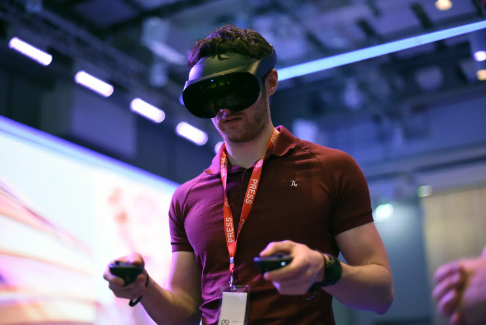Meta’s Next Enterprise Play is Anchored on the Metaverse
Meta’s B2B solution, Workplace, was initially conceived as a Facebook for enterprises. Meta later moved Workplace to its “Reality Labs” division charged with the company’s metaverse projects, thereby bringing the service in close proximity to its VR business where it has already pumped in billions of dollars.
Meta has recently announced a raft of new developments that align with its new pivot. These include a number of enterprise services that target its new effort to rope in businesses to use its new high-end Meta Quest Pro headset that has been built for the prosumer market. The high-spec headset retails at $1,499 and targets workplace use cases.

Meta also announced a new Horizon Workrooms version along with new partnerships with Accenture, Microsoft, Adobe, and Autodesk. These partnerships are aimed at building out more designer-ready and enterprise-ready virtual reality services.
Meta’s pivot to the enterprise metaverse market has a business logic to it. It is the business enterprises that are most likely to be the long-term buyers of virtual reality technology. Meta was already starting to build applications and experiences for these enterprise clients although it didn’t complete all of them. For instance, the company sunset its Oculus for Business and replaced it with Quest for Business which is now in closed beta. The company says it has learned a lot from this transition.
At the same time, Meta has also been rolling out new hardware to rave reviews although the company’s consumer content for the hardware is yet to take off in a big way. Still, the company has so far spent $1.5 billion on Quest games and apps which has contributed considerably to the advancement of the industry, particularly in the consumer market segment.
Meta’s other major enterprise effort, the Workplace, is also seeing some stagnation in its native product development. Its big integration with Microsoft’s Teams also pointed to the company’s focus on partners. The next logical step for Meta is, therefore, to build more enterprise services for its hardware. This is more so as the company is now looking to push its new device into the market and trying to score customer buy-in.
The strategy is anchored on the new device, Quest Pro, itself. Meta has gone out of its way to highlight how its features such as the high-contrast pancake optics and the color passthrough (full-color mixed reality) functionality, easily lend themselves to workplace applications, such as when working with documents and collaborating on virtual reality screens while still retaining the ability to interact with the physical environment.
While the graphics previews appear to be wanting and have been mocked widely, Meta says two important features, facial recognition, and eye-tracking, have improved considerably and now allow for the rendering of more realistic avatars. While realistic avatars may not be a top priority for the enterprise customers Meta is targeting, they are still nice to have in immersive experiences.
Even more importantly, Meta is now unveiling an enhanced Horizon Workrooms that allows for collaboration with others in virtual reality. These enhancements include the incorporation of breakout groups and “sticky notes” for virtual whiteboards. There are also multiple screens, 3D modeling, Zoom integration as well as “Magic Rooms” which allows teams to create in VR people drawn from remote and in-person environments.
A number of startups are already developing various permutations of these features geared at enterprise mixed-reality applications. A good example of this is Gravity Sketch.
Meta putting an emphasis on Horizon Workrooms is a great move that builds on its strengths. The first Workrooms version launched in August 2021. Another complement to these efforts is Meta’s growing relationship with Microsoft which is focused on virtual reality and services for enterprises. The partnership will entail adding Teams and Windows 365 to the Quest Pro headset and bringing the Quest Pro avatars to Teams. Importantly, the closer collaboration between Meta and Microsoft will also culminate in the integration of some of Microsoft’s services like device management and enterprise security into Quest Pro’s environment. This is key to bringing more enterprises on board.
It is on this front that Meta‘s next major partnerships will come out strongly. Meta is also planning to work closely with Accenture which will be the bridge between the company and enterprises. Accenture uses consultants and integrators to embed technology in enterprises and get it operational. Accenture has already distributed 60,000 Quest 2 headsets to its employees, a major investment in mainstreaming Meta hardware.
https://virtualrealitytimes.com/2022/10/29/metas-next-enterprise-play-is-anchored-on-the-metaverse/https://virtualrealitytimes.com/wp-content/uploads/2022/10/Meta-Quest-Pro-Headset.pnghttps://virtualrealitytimes.com/wp-content/uploads/2022/10/Meta-Quest-Pro-Headset-150x90.pngBusinessMeta’s B2B solution, Workplace, was initially conceived as a Facebook for enterprises. Meta later moved Workplace to its “Reality Labs” division charged with the company’s metaverse projects, thereby bringing the service in close proximity to its VR business where it has already pumped in billions of dollars. Meta has recently...Rob GrantRob Grant[email protected]AuthorVirtual Reality Times - Metaverse & VR
